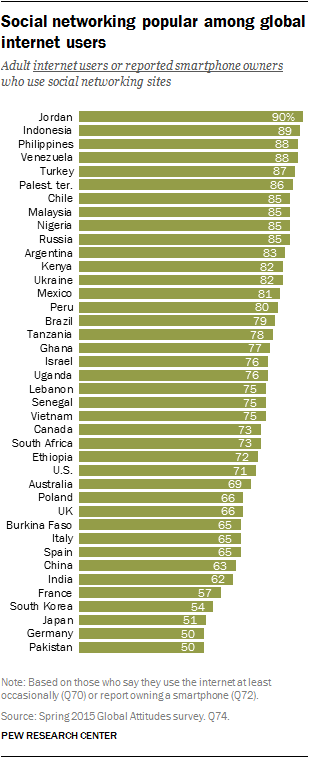Once online, people in emerging and developing nations are hungry for social interaction. Majorities of adult internet users in almost every emerging and developing nation surveyed say that they use social networking sites, such as Facebook and Twitter. Comparatively fewer online adults in advanced economies say they use social networks, though half or more still report using social media in these countries. It is important to note that while internet users in emerging and developing economies are more likely to use social networks, access rates are lower in many of these nations; as a result, many people are still left out of the social networking experience. But in most of the countries surveyed, Millennials are more likely to use social media.
At least half of all adult global internet users are social networkers
 Across the 40 countries surveyed, a median of 76% of internet users say that they use social networks, which include Facebook and Twitter in all countries (except for Twitter in China), plus other popular country-specific social networks.
Across the 40 countries surveyed, a median of 76% of internet users say that they use social networks, which include Facebook and Twitter in all countries (except for Twitter in China), plus other popular country-specific social networks.
Unlike overall internet access, online adults in emerging and developing nations are more likely to use these forms of social media compared with their rich-country counterparts. Social networking is most prevalent among online adults in Jordan (90% of internet users), Indonesia (89%), the Philippines (88%), Venezuela (88%) and Turkey (87%). But majorities of internet users in every emerging and developing nation surveyed, Pakistan excepted, say they use social networks.
Comparatively fewer online adults in rich economies say they use social networks, but because internet access is greater in many of these countries, overall social media usage based on total adult population is more mixed. Still, 76% of online Israelis, 73% of online Canadians and 71% of online Americans say they use social networking sites. But only around half of online adults in Japan (51%) and Germany (50%) say the same.
Between 2013 and 2015, there has been some upward movement in the percentage of people who access social networks across many emerging countries. This is especially the case in China, where 63% of internet users report using social networking in 2015, up from 48% in 2013. Elsewhere the change has been less dramatic or no change has occurred. But because internet access and reported smartphone ownership rates have increased in most of these nations, more people are using social networks even as the proportion of internet users who say they do so has not changed dramatically, if at all.
 As with internet usage and reported smartphone ownership, Millennials are more likely to be social networkers compared with those ages 35 and older. There is a significant age gap on social networking among internet users in 30 of the 40 countries surveyed. And this age gap is seen in developed and developing countries alike.
As with internet usage and reported smartphone ownership, Millennials are more likely to be social networkers compared with those ages 35 and older. There is a significant age gap on social networking among internet users in 30 of the 40 countries surveyed. And this age gap is seen in developed and developing countries alike.
For example, 81% of online Germans ages 18-34 say they use social networking, versus only 39% of older online Germans. And 83% of young French internet users are social networkers, versus 42% among older internet users. Large age gaps also appear in Vietnam (+37), Poland (+35) and Japan (+35). It should be noted that, based on total population, the gap in social media use between older and younger generations is even larger because more young people in all of the countries surveyed are online to begin with. But even among active internet users, social networking is more common among global youths.
In addition to age, there are also differences on social networking use among online adults by education. However, significant gaps on education are not as common for social networking as they are for overall internet access and smartphone ownership. In 18 countries with large enough sample sizes for analysis, internet users with more education are significantly more likely to use social networking sites compared with less educated online adults. The education gaps are particularly large in Lebanon (+30) and China (+26).


